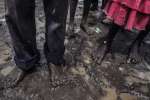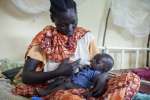- Text size
 |
|  |
|  |
| 
- عربي
Rising malaria health threat for Congolese refugees in Uganda
News Stories, 3 December 2012
RWAMWANJA, Uganda, December 3 (UNHCR) – After surviving the trauma of forced displacement and insecurity, thousands of Congolese refugees are facing a new and potentially fatal danger in Uganda – malaria.
It's also a challenge for UNHCR and its partners working at the Rwamwanja refugee settlement in western Uganda's Kamwenge district. "It's the rainy season so now is the time that people catch malaria. There are lots of mosquitoes," said Evariste Kalozi, senior medical officer at Rwamwanja's health centre. "They are not used to it," he said of the refugees.
But the resources to deal with this threat are limited. There is only one health centre to service a population of more than 30,000 refugees and 35,000 Ugandans living in and around the settlement, which is spread over a wide area and includes 16 villages. Children are particularly at risk.
Moreover, the fighting and rebel advance last month across the border in Democratic Republic of the Congo (DRC), raised fears of a major influx of refugees, which would exacerbate the situation. This has not happened to date, but the situation remains volatile and could change in the future.
In a funding appeal launched in September, UNHCR said the needs for this year in Rwamwanja included two new health facilities and equipment for the existing health centre as well as more medical staff, medicine and medical supplies. The settlement was only reopened in April to shelter refugees fleeing the first wave of this year's conflict in DRC's North Kivu province.
Kalozi said preventive measures were essential, including awareness campaigns about malaria and the importance of using mosquito nets and spraying the inside of homes with insecticide. "We have to inform the refugees about the disease and how important it is that they come to hospital quickly," he stressed.
The medical players also need to be ready to help those who have caught malaria. "The incidence of malaria here is high. Children get sick from malaria, which eventually leads to anaemia. We have to be very quick [and treat them within 24 hours]," said Kalozi.
But UNHCR health worker Rose Immaculate said that it was a major challenge getting the refugees to understand the gravity of their situation because most hailed from mosquito-free hill areas of North Kivu. "We have given mosquito nets to the refugees, but they do not use them. They cut the mosquito nets and use them to tie the roof on their shelters" she said.
"When the refugees are sick, most of them prefer to use traditional medicine and herbs. It is only when this does not work that they go to the hospital, but it may be too late," Immaculate added.
Fifty-two-year-old Harerimana, who fled the North Kivu town of Bwito in June with his wife and seven children, is one of those who does understand the health issues. But he says that Rwamwanja's health centre is a five-kilometre walk from their village. "We need an outpost closer to the village," he stressed.
Immaculate said the refugee agency had opened two new health outposts in the settlement. She added that UNHCR was working with the district and local authorities to form refugee volunteer village health teams "to reach out and educate the communities on health issues … and make home visits [to identify the sick and refer them for treatment]."
More than 100 volunteers have been trained and their job includes telling other refugees about the dangers of malaria and other health problems, including diarrhoea, pneumonia and malnutrition, and how to prevent or respond to them. They also refer cases to the health centre.
But Immaculate said more outreach was needed to reduce the risks of catching malaria between December and February, the peak period. But she highlighted the current shortages of medicine at the medical centre, "We have very little," she said, adding: "The next step would be to train them [village health teams] to treat malaria at household level."
Malaria, if not brought under control, could also affect the malnutrition rate, which currently stands at 8.49 per cent of screened children under the age of five. "If they have malaria, children can get severe malnutrition and anaemia. It is often combined" said Kalozi.
He said Rwamwanja settlement could be open for a long time, which meant several measures should be taken. These included community sensitization for behavioural change, training of village health teams in home-based care, capacity building for health workers, ensuring an adequate supply of medical drugs and giving the community the skills to prevent and control malaria.
By Céline Schmitt in Rwamwanja, Uganda





















































